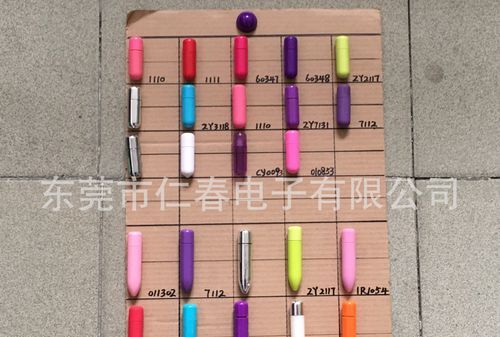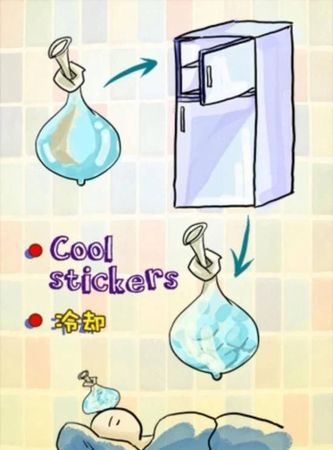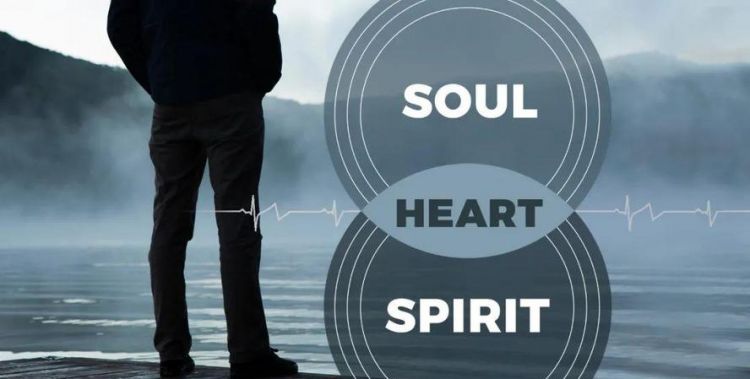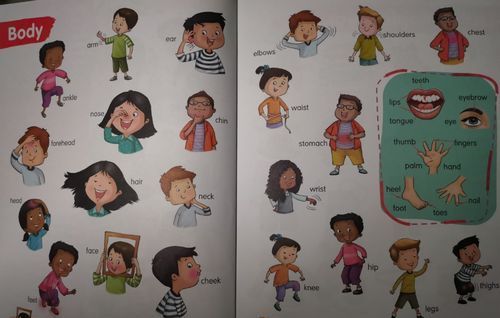本文目录
bite sb. in the leg
face,eye,chest,stomch用in
head,ear,shoulder,leg用on
这些由于没什么规律,只好靠死记了!^_^
另外提醒一下,在这些部位前一定要用冠词“the”
例如 pat/hit/bite+in the face/eye

英语身体部位名词作动词用
一、利用搭配:
(一)与动词搭配
用人体的各种姿态表示各种感情
He shook his head over the plan.他不赞成这项计划。
The sight of it turned my stomach.那景象使我恶心。
The girl likes to wag her tongue.这个女孩子喜欢夸夸其谈。
He snapped his fingers at the danger.他对这危险毫不在意。
Mary makes eyes at all handsome young men.玛丽每见英俊青年便频送秋波。
My friend turned up his nose at my proposal我的朋友对于我的建议嗤之以鼻。
Don't bite your nose to spite your face.不要使自己过不去。
The crowd shook their fists at the despicable criminals.群众对这些可鄙的罪犯挥拳表示愤怒。
(二)形容词、all或副词与人体各部分名词连用
1.形容词在名词前:
He has a long head, but a big mouth.他有远见,但讲话冒失。
The children have a sweet tooth.这些孩子们喜欢甜食。
His elder sister has a sharp(smooth, silver)tongue.他的姐姐讲话尖刻(圆滑,流利。)
This man has an open hand.这个人很慷慨(用钱大方,大手大脚)。
The merchant has an itching palm.这个商人十分贪财。
She has a sharp eye(or sharp eyes)and sharp ear(or ears).她目光锐利,听觉灵敏。
2.“all+人体各部分复数(有时可用单数)名词”固定词组,可起强语势作用:
I am all ears.我在用心聆听。
Olivia is all legs.奥利维亚又瘦又高。
He is all thumbs(=very clumsy).他笨手笨脚。
Jerry followed him, all eyes, ears and spikes.(Dickens)杰里睁大眼睛,竖起耳朵和硬发,全神贯注地跟着他走。
(三)介词或连词and与人体各部分名词连用,构成固定词组
1.介词+名词:
Don't let Success go to your head.不要让胜利冲昏了头脑。
The good news carried her off her feet.这条好消息使她欢腾雀跃(或忙得团团转)。
He has English and American literature at his finger tip.他精通英国文学和美国文学。
Time hangs heavy on my hand.我觉得没事干很无聊。
The spirited competition kept them on their toes.激烈的竞争使他们保持警觉。
He looks very down in the mouth .他面容非常沮丧。
The workers worked in the teeth of the storm.工人们顶着暴风雨继续工作。
I am up to my neck(eyes,ears)in work. 我有许多工作要作。
The current situation in that country has got out of hand.那个国家当前的局势有控制不住之势。
2.名词+介词+名词:
Theory must go hand in hand with practice.理论必须与实践相结合。
He is head over ears in love with that beautiful girl.他热恋着那个漂亮的女孩子。
She didn't see eye to eye with me on the question.在这个问题上,她和我看法不一致。
His friend had a heart-to-heart talk with him.他的朋友和他进行了一次知心的谈话。
3.名词+and+名词:
Our frontier guards fought the cruel aggressors tooth and nail.我们边防战士和凶恶的侵略者进行殊死的战斗。
Tom Came back home a very wreck of soul and body.汤姆回来时筋疲力尽了。
In a short time our industry will advance neck and neck with the developed countries. 不久以后我们的工业将与发达国家并驾齐驱。
4.其他惯用法:
She cried her heart out over the death of her husband.她丈夫的死使她痛苦欲绝。
He wore his heart on his sleeve.他心直口快。
She got a big hand in the last performance.她在上次演出中受到观众的热烈鼓掌。
Please keep a civil tongue in your head.请注意措词要谨慎一些。
I was rushed off my legs by my work.工作把我累得团团转。
You must keep your head under any circumstances.无论任何情况你一定要保持镇静。
His heart sank into his boots at the bad news.听到这个坏消息他非常沮丧。
He felt he must put his foot down.他觉得他必须采取断然措施。
She put her best foot forward in the performance.她在这次演出中露了一手。
He cudgeled(racked,beat)his brains over these problems.对于这些难题,他煞费苦心地思索。
He put his finger on her weakness.他中肯地指出她的缺点。
He was smitten with her charms,and quite lost his heart(=fell in love with her).他为她的美貌所倾倒,迷恋着她。
二、利用构词法
(一)英语的动词优势
英语的动词优势使说英语为本族语的人经常把表示人体的概念直接投射表示抽象的概念,表现在英语中这类英语名词常被转化为动词,以增添它们的描绘效果[2],如head the committee, face the future,Hand the keys, mouth one's opinion, eye a needle, nose for information, be armed to the teeth, shoulder the responsibility, elbow one's way etc,这类转换除字面意义外还可表达这动词的带各种各样情感的动作.如用eye来表达look的意思,除了“看”这一中性意义之外,还兼有怀疑地看,斜着眼睛瞧,带着嫉妒不满、羡慕等感情的意思,例如The dog eyed the stranger(=looked at the stranger with suspicion)(这条狗怀疑地瞧着生人。)They were eyeing us jealously(admiringly,disappointe
dly)。(他们嫉妒地、羡慕地、失望地看着我们。)这种转化的其它例子如:
This dictionary is badly thumbed.(这部字典因翻阅过多而弄得很脏。)
Who has hired you to nose into my business?(谁雇用了你来过问干涉我的事务?)
How might she tongue me!(Shakespeare)(她将会怎样地说我啊!)
Who can stomach such an insult?(谁能容忍这样的侮辱?)
There stood a model worker breasted with many medals.(那里站着一位劳模,胸前挂着许多奖章。)
The policemen have been fingering the criminal for weeks.(警察秘密监视这个犯罪分子已有数周。)
(二)利用“形容词、副词、过去分词或动词+人体各部分名词”构成复合词
1.“形容词+人体各部分名词+ed”构成形容词,如sharp-tongued(说话尖刻的),sharp-eyed(目光锐利的),sharp-eared(听觉敏锐的),long-headed(有远见的),big-mouthed(饶舌的),open-minded(谦虚的,接受意见的),iron-handed(铁腕的),high-handed(采取高压手段的),close-fisted(吝啬的),double-faced(hearted)(奸诈的)等。
He muttered a half-hearted apology.他含糊地半心半意地道了一声歉。
Don’t feel down-hearted about this matter.对于这件事请勿灰心丧气。
He sat there in open-mouthed oblivion.他大张着嘴,木然地坐在那里。
She was a warm-hearted,home-spun woman.她是一个热心肠的,土生土长的妇女。
Antony was a silver-tongued orator.安东尼是一位能言善辩的演说家。
2.“过去分词+人体各部分名词+ed”构成形容词:
The broken-hearted soldiers of the defeated country wept when they heard the cease-fire news.战败国伤心的士兵听到停战消息时流了泪。
3.“形容词+人体各部分名词”构成复台名词,指具有某种特殊性格的人。
Smith is a hot-head.史密斯是个性情暴躁的人。
Juliet is a big-mouth.朱丽叶是个长舌女人。
4.“动词+人体各部分名词”构成复合词,可作形容词,亦可用来指人:
His car travelled at break-neck speed along the highway.他的小汽车以非常危险的速度在公路上疾驶。
What a lack-brain is this!(Shakespeare)真是一个头脑何等简单的人!

bite的用法总结及词组
bite
v.(动词)
bit[b¹t] bit.ten[b¹t“n] 或 bit bit.ing, bites
v.tr.(及物动词)
To cut, grip, or tear with or as if with the teeth.
咬:用牙或好象用牙撕、咬或扯
To pierce the skin of with the teeth, fangs, or mouthparts.
咬破,撕裂:用牙、齿或口器咬穿皮肤
To sting with a stinger.
螫,叮:用螫针螫
To cut into with or as if with a sharp instrument:
刺穿:用利器等刺穿:
The sword bit straight through the wooden shield.
剑锋刺穿了木盾
To grip, grab, or seize:
握住、攫住或抓住:
bald treads that couldn't bite the icy road; bitten by a sudden desire to travel.
光滑的鞋底在结冰的路面上打滑;突然对旅游产生了浓厚的兴趣
To eat into; corrode.
腐蚀,侵蚀
To cause to sting or be painful:
刺痛,疼痛:
cold that bites the skin; a conscience bitten by remorse.
寒冷刺骨;受悔恨煎熬的良心
v.intr.(不及物动词)
To grip, cut into, or injure something with or as if with the teeth.
咬:用牙咬、叮或弄伤
To have a stinging effect.
刺痛:产生刺痛的结果
To have a sharp taste.
有刺激味道的
To take or swallow bait.
上钩:抓住或吞下诱饵
To be taken in by a ploy or deception:
上当,被骗:被策略或诡计所欺骗:
tried to sell the Brooklyn Bridge, but no one bit.
想卖布鲁克林桥,但没人上当
n.(名词)
The act of biting.
叮,咬:咬,叮的动作
A skin wound or puncture produced by an animal's teeth or mouthparts:
伤口:被动物牙齿或口器咬伤的皮肤上的伤口:
the bite of an insect.
昆虫咬的伤口
A stinging or smarting sensation.
刺痛感:剧烈刺痛的感觉
An incisive, penetrating quality:
尖刻,尖锐:尖锐,锋利或透彻的品质:
the bite of satire.
尖刻的讽刺
An amount removed by or as if by an act of biting:
一口,少量:咬一口的量:
Rezoning took a bite out of the town's residential area.
重新分区后在城市住宅区占了一小块地方
An amount of food taken into the mouth at one time; a mouthful.
一口食物;一口,少量:一次吞入口的食物量;一口的量
Informal A light meal or snack.
【非正式用语】 点心:少量的一顿饭或零食
The act or an instance of taking bait:
上钩:上钩的行为或事例:
fished all day without a bite; an ad that got a few bites but no final sales.
一整天没半条鱼上钩;这则广告吸引了一些人上钩,但最后还是没有卖出东西
A secure grip or hold applied by a tool or machine upon a working surface.
固定器:在工作面上使用工具或机器的夹紧或固定装置
The part of a tool or machine that presses against and maintains a firm hold on a working surface.
固定点,卡紧:工具或机器上紧压工作面保持固定的部分
Dentistry The angle at which the upper and lower teeth meet; occlusion.
【牙科学】 牙齿的咬合:上下齿的咬合情况;牙咬合
The corrosive action of acid upon an etcher's metal plate.
腐蚀:蚀刻器的金属盘上的酸腐蚀
Slang An amount of money appropriated or withheld:
【俚语】 一笔钱:一次拨取或扣留的钱数:
trying to avoid the tax bite.
设法逃税

bite的过去式过去分词
bite的过去式是:bit;过去分词是:bitten;现在分词: biting;第三人称单数: bites;复数: bites,bite做动词有咬、叮、蜇等意思。
bite的用法
bite的用法1:bite的基本意思是“用牙齿或牙齿类物攻击”,一般译为“咬”,指用牙(尤指门牙)短暂性地、猛烈地咬入某物,将其咬住、咬透或咬掉,也可指“咬伤”。引申指“某种非凡的力量牢牢抓住、刺透、刺入某物”。用于比喻可指“上钩,上当”。
bite的用法2:bite的主语可以是人或动物,如狗、蚊虫等,也可以是物,如车、辣椒等,其宾语可以是人,也可以是物。
bite的用法3:bite可用于被动结构,当宾语是人时,被咬的部位(如“脸”),常用介词in或on引出。
bite的用法4:bite的过去式为bit,过去分词为bitten或bit,但现代英语中bit这种过去分词不常用,特别是在美式英语中。

以上就是关于bite加身体部位用法 ,bite sb. in the leg的全部内容,以及bite加身体部位用法 的相关内容,希望能够帮到您。

